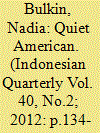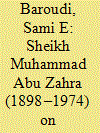| Srl | Item |
| 1 |
ID:
188977


|
|
|
|
|
| Summary/Abstract |
This article examines the depiction and construction of Muslim identity in Indonesian cinematic discourse. We conducted a close reading of our case study, which is Nurman Hakim’s Islamicate film trilogy about Indonesian Muslims: 3 Doa 3 Cinta (2008), Khalifah (2011), and Bid'ah Cinta (2017). Consistently exploring the theme of moderate Muslim identity in the age of global terrorism, the films shed light on the development of Indonesian Muslim self-representation over a decade (2008–2017). The goal of discourse analysis is to assess how narrative and stylistic elements in films are used to construct a moderate Muslim identity. Our findings indicate a shift in the identity discourse between the first and subsequent films. While the first film attempts to construct a moderate Muslim identity as a reaction to illiberal Islamophobia, the second and third films move toward articulating liberal Islamophobia. We argue that this dynamic of representational politics reflects contemporary Indonesia’s shifting political discourse on moderate Islam.
|
|
|
|
|
|
|
|
|
|
|
|
|
|
|
|
| 2 |
ID:
120024


|
|
|
| 3 |
ID:
158080


|
|
|
|
|
| Summary/Abstract |
The literature on Political Islam has not devoted ample space to the intellectual contributions of contemporary moderate Islamists. This article attempts to rectify this by examining the international relations discourse of a twentieth-century Egyptian religious scholar: Sheikh Muhammad Abu Zahra. Despite Abu Zahra's prominence in the Islamic world, his writings have received scant attention from academics. The article provides a close reading of his three principal works on international relations: al-ʿAlaqat al-Duwaliyya fi al-Islam, Nazhariyat al-Harb fi al-Islam and al-Wihda al-Islamiyya; as well as a fourth work with a significant bearing on the subject: al-Mujtamaʿ al-Insani fi Dhil al-Islam. It contends that Abu Zahra's international relations discourse is part of a more than a century-old tradition of theorizing on international relations that dates back to the religious reformers Jamal al-Din al-Afghani and Muhammad Abdu. Accordingly, Abu Zahra is treated here as an exemplar of what I refer to as the moderate and reformist school in contemporary Islam, in contradistinction to the radical school that is associated with salafi-jihadist figures and movements. A close analysis of Abu Zahra's international relations discourse thus provides penetrating insights on one pivotal, albeit understudied, dimension of this reformist/moderate current in contemporary Islam: its perspectives on international relations.
|
|
|
|
|
|
|
|
|
|
|
|
|
|
|
|